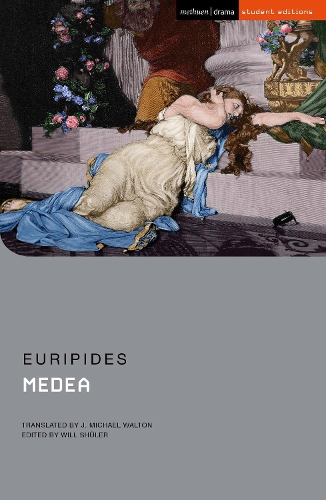
Medea
(Paperback, 2nd edition)
Available Formats
Paperback
Published: 19th May 2022
Paperback
Published: 1st October 2009
Paperback, New edition
Published: 1st August 2006
Hardback
Published: 21st March 2008
Paperback, Main
Published: 19th November 2014
Paperback, 2nd edition
Published: 22nd January 2026
Paperback
Published: 23rd December 1996
Paperback
Published: 1st April 2008
Paperback, New edition
Published: 1st January 1991
Paperback
Published: 29th August 2000
Paperback
Published: 5th July 2004
Paperback, New edition
Published: 1st March 2002
Publishing Details
Medea
By (Author) Euripides
Translated by J. Michael Walton
Volume editor Will Shler
Bloomsbury Publishing PLC
Methuen Drama
22nd January 2026
2nd edition
United Kingdom
Classifications
Tertiary Education
Non Fiction
882.01
Physical Properties
Paperback
80
Width 128mm, Height 196mm, Spine 8mm
75g
Description
A Student Edition of Euripides' play, which accessibly unpacks Greek tragedy in its social context, issues of translation and adaptation, and performance approaches over the centuries.
Euripides' play Medea was first produced in 431BC and continues to be produced globally to this day. Its power and timeless appeal for audiences rests in its portrait of a woman driven to murder the new wife of the man who abandoned her and to murder her own children. In more recent times, Medea's actions have been taken as a symbol of female power in an otherwise male-dominated society.
Will Shuler's commentary in this Student Edition looks at the violence of the play - both onstage and off; the original performance conditions; staging challenges, both then and now (including Medea's exit on a dragon); the notion of myth and how Greek tragedians were telling old stories to get new meanings; and how the play has evolved through translation.
It considers a range of productions up to the present day, including the 2014 National Theatre production directed by Carrie Cracknell and starring Helen McCrory; Sophie Okonedo as Medea at the Soho Theatre, London, in 2023; and the 2000 Australian version, Black Medea, which interpreted Medea as an indigenous woman brought to a city by her ambitious husband.
Author Bio
Euripides was born near Athens between 485 and 480 BC. His first play was presented in 455 BC and he wrote some 100 altogether of which nineteen survive a greater number than those of Aeschylus and Sophocles combined and which include Alkestis, Medea, Bacchae, Hippolytos, Ion and Iphigenia at Aulis. He died in 406 BC.
Will Shuler is Senior Lecturer in Drama and Theatre Studies at Royal Holloway, University of London, UK. His research and teaching focus on performance pedagogies, teaching and performance-making with new technologies, as well as Queer theatre and Greek tragedy.
